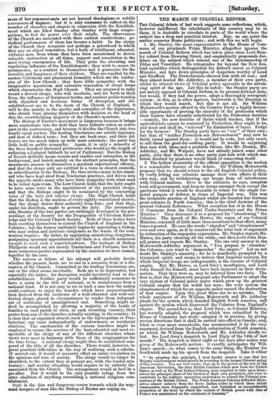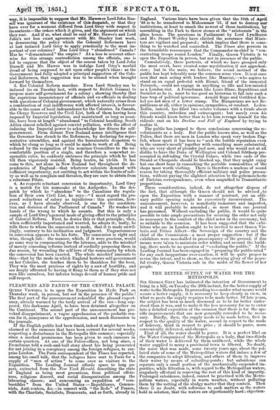THE NAM'S OF COLONIAL REFORM
THE Colonial debate of last week suggests some reflections, which, however indifferent the inhabitants of this country may be to them, it is desirable to circulate in parts of the world where the subject has a deep and practical interest. Nay, on one point the matter concerns Home politicians ; and with this we will begin. 1. Mr. Stanley, the quasi representative in the House of Com-. mons of our proximate Prime Minister, altogether ignores the march of Colonial Reform which has taken place since Lord Stan- ley retired from Downing Street, and emphatically propounds doe- trmes on the subject which remind one of the statesmanship of Eldon and Vansittart. He retrogrades far beyond the New Zea- land squabbles which distinguished his father's career as Colonial Minister, and lays clown principles of despotism worthy of Laud and Strafford. The Protectionists cheered him with all zeal ; and they almost hooted Mr. Adderley, a member of their own party, whilst he uttered views of Colonial policy agreeable to the advan- cing spirit of the age. Let this be noted: the Stanley party are not merely opposed to Colonial Reform in its present forward state,. but would, if they had the power, adopt a thoroughly retrograde system : in this, as in other matters, backwards is the direction in which they would march. But this is not all. Sir William Molesworth's motion offered to the Country Party a highly favour- able opportunity of proving the sincerity, of the profession which their leaders have recently substituted for the Protection doctrine —namely, the new doctrine of theirs which 'teaches, that if the agriculturists cannot be sustained by Protection, they ought to be, and must and shall be, "relieved" by diminution of taxes. Fudge for the farmers! The Stanley party have no " cry " of their own ; but that of "neither Protection nor _Retrenchment" may now be fairly raised against them : it would not be rude, but only exact, to call them the good-for-nothing party. It would be suiprising that men with ideas and a probable future, like Mr. Henley, Mr. Adderley, and Mr. Walpole, have not already joined some other party, only that there is no other party just now_with which ank- bition directed by prudence would think of connecting itself. 2. The hollow insincerity of the official opposition to the motion is a remarkable feature of the debate. Sir William Molesworth proposes that we should return to the old English Colonial policy, by really letting our colonists manage their own affairs in their own way, and by withdrawing our troops from all interference with Colonial matters. Give to the colonists, he says, complete- local self-government, and keep no troops amongst them except the garrisons which it would be desirable to retain for the single Im- perial purpose of defence in times of Imperial war. This was. the invariable practice of England whilst she founded her thirteen great colonies in North America • this is the chief doctrine of the present Colonial Reformers. What reception has it in the House of Commons from the Colonial 'Under-Secretary and the Prime Minister ? They denounce it as a proposal for " abandoning " the Colonies. The speech of Mr. Hawes, the organ of our Colonial Minister, consisted of little more than assertions to that effect, many times repeated. He uses the words" abandon" and "abandonment" over and over again, as if to countervail the total lack of argument by reiteration of the unpopular expressions. Mr. Stanley repeats Mr. Hawes, his party cheering all the while ; and thenl,ord John Rus- sell praises and repeats Mr. Stanley. The one only answer to the Molesworth-Adderley argument is, "You propose to 'abandon" the Colonies ; you want to 'dismember' the empire." Let us not doubt Mr. Stanley's sincerity; for he is manifestly prompted by a tyrannical spirit, and seems to believe that Imperial coercion, for which Imperial troops are indispensable, is the essence of Colonial empire. But Mr. Hawes, as Lord Grey's mouthpiece, and Lord Sohn Russell for himself, must have been insincere in their decla- mation. That they were so, may be inferred from two facts. The- first is, that the Molesworth proposal asks Parliament to adopt the very system of Colonial policy under which grew up the greatest Colonial empire that the world has seen ; the very system the- abandonment of which for an opposite policy caused the destruction of that empire. Upon this point there can be no mistake. The whole argument of Sir William Molesworth and Mr. Adderley' pleads for the system which founded English North America and against the system which dissevered the Colonies from England's- empire. The second fact is, that Lord Grey, as Colonial Minister„ has recently adopted the proposal which was submitted to the House of Commons last week—adopted it in practice, by giving precise directions that it shall be carried into effect in Canada; and„ what is even more remarkable, has recommended it by the very argument, derived from the English colonization of North America,. on which Sir William Molesworth and Mr. Adderley chiefly re- lied. See Lord Grey's despatch to Lord Elgin of the 14th of last month.* The despatch is dated eight or ten days after notice was given of the Molesworth motion : it exactly anticipates Sir Wil- liam's speech ; or, what comes to the same thing, the Member for Southwark made up kis speech from the despatch. Take it either * "In adopting this principle, I need hardly observe to you that her Majesty's Government would merely be reverting to the former Colonial policy of this country. You are well aware that up to the period of the war of the. American Revolution, the then British Colonies which now form the United States, as well as the'West Indian Colonies, were required to take upon them- selves the principal share of the burden of their own protection, and even to- contribute to the military operations undertaken to extend the Colonial pos- sessions of the British Crown. The North American Colonies defended them- selves almost entirely from the fierce Indian tribes by which these infant communities were frequently emperilled, and furnished no ineonsiderable proportion of the force by which the contest of British power with that of France was maintained on the continent of America."
way, it is impossible to suppose that Mr. Ilaweser Lord John Rus- sell was ignorant of the existence of this despatch, or that they have ever for a moment differed from Lord Grey with respect to its contents—the orders which it gives, and the argument on which they rest. And if so what shall be said of Mr. Elawes's and Lord John's not less exact agreement with M. Stanley last week, in denouncing the policy which the Colonial Reformers have at last indeeed Lord Grey to apply practically to the most im- portant of our colonies ? Has Lord Grey "abandoned" Canada? Has he "dismembered" the empire? At a loss to account other- wise for this strange contradiction among the officials, one is led to suppose that the object of the course taken by Lord John Russell and Mr. Hawes was to indulge Lord Grey's morbid dread of being supposed to act upon other people's ideas : as the Government had fully adopted a principal suggestion of the Colo- nial Reformers, that suggestion was to be abused when brought forward by themselves.
3. But Colonial Reform marches. Even Lord Stanley can be induced (as on Tuesday last, with respect to British Guiana) to propose more self-government for a colony ; showing thereby that the capricious inconsistency of officials and ex-officials in dealing with questions of Colonial government, which naturally arises from a combination of real indifference with affected interest, is favour- able to the cause of local independence for the Colonies. In Canada, the Clergy Reserves and the Civil List, both of them having been imposed by Imperial legislation, and maintained as long as possi- ble, have been at length " abandoned " to Colonial handling. South Africa almost rebelled against convict pollution, with the effect of inducing the Imperial power to acknowledge her fitness for self- government. From distant New Zealand comes intelligence that the Governor has struck to the Reformers, by declaring for repre- sentative, uesemblies, and against the bureaucratic despotism to which he-clung as long as it could be made to work at all Being reduced by the resignation of his nominee Councillors to the un- comfortable position of a single and therefore a somewhat re- sponsible ruler, he suddenly embraces the principle which he had till then -vigorously resisted. Being beaten, he yields. It has come to -this, not alone in New Zealand but throughout the de- pendencies of England—that whatever colonists demand with sufficient importunity, not omitting to act within the limits-of safe- ty as well as to complain and threaten, they are sure to obtain from a reluctaat Pilate.
4. As respects reluctant concession to importunity, Lord Grey is a match for his namesake at the Antipodes. In the des- patch by which lie " abandons " to the Canadians the regula- tion of their own Civil List, he says—" I must regard tho pro- posed reductions of salary as injudicious this question, how- ever, as I have already observed, is one for the considera- tion and decision of the Parliament of Canada." He washes his hands of the wrong to which he assents. But this is only a sample of Lord Grey's general mode of giving effect to the principles of Colonial Reform. First, he denies this or that principle ; then, when sufficiently, importuned and worried, he adopts it; lastly, he tells those to whom the concession is made, that it is made unwil- lingly, contrary to his inclination and judgment. Ungraciousness in concession appears to be his forte. The concession is right and wise, though late : the manner, which, if it were gracious, would go some way in compensating for the lateness, adds to the mischief of merely conceding reform's instead of cordially proposing them in due season, by wounding the self-love of the community by which the concession has been exacted. The whole mischief amounts to this—that by the mode in which England bestows self-government on her Colonies, she teaches them to be thankless for the boon. They win the most precious of rights by a sort of hostility, and are deeply affronted by having it flung to them as if they were not men like ourselves, but inferior beings devoid of human pride and self-respect.



























 Previous page
Previous page